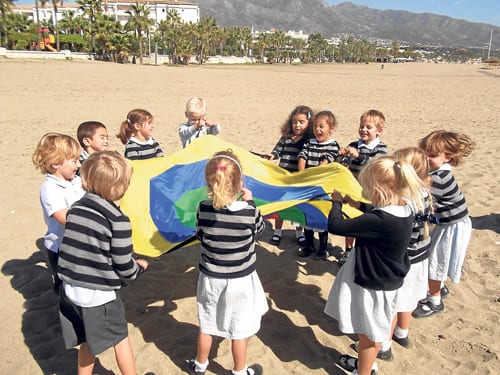IT’S renowned for its beaches and good quality of life.
But many parents moving to the Costa del Sol may be unaware that the coast supports over two dozen international schools.
Between Sotogrande and Almunecar, a host of British, German, French and even Scandinavian schools compete with each other in the lucrative market of private education.
With 20% of the Costa del Sol’s population officially foreign, it’s not surprising that so many expat schools have opened here.
Marbella alone, home to more than 33,000 foreigners (population approximately 140,000) is reported to have the largest concentration of international schools after Madrid and Barcelona.
The rise of the international schools can be attributed back to former dictator Franco who introduced tourism to the Costa del Sol in the 1960s as a way of combating poverty among the sleepy fishing ports.
Since then, a steady influx of foreigners have decided to settle in their thousands along the coast making it a true melting pot of cultures.
With English establishing itself as the lingua franca of the world and arguably the language of tourism (the Costa del Sol’s main source of income), British schools have flourished and are said to account for roughly two-thirds of the private schools on the coast.
One of the oldest is Swans School in Marbella, which opened in 1971, while neighbouring Aloha College was established in 1982.
The spread of British schools goes from Sotogrande in the West to Almunecar in the East.
The most recent international school, The British School of Marbella, opened in September 2010 and is already looking to expand to a second campus in the town.
Most British schools are members of the National Association of British Schools in Spain (NABSS) and are inspected regularly in a manner similar to the UK’s Ofsted inspections.
It’s worth noting that all international schools are fee paying compared to Spanish state schools which are open to all EU citizens and free from pre-school to 18.
And it’s not just foreigners sending their children to international schools.
Many schools along the coast have a large number of Spanish pupils enrolling as parents discover that being fluent in another language gives them an advantage in the job market.
But whatever the future holds for the Costa del Sol, it can only be a good thing for the economy that a new generation are growing up multi-lingual.
So what to choose?
Of course the school or college you choose will depend on many variables: distance from home, budget, academic standards and style of teaching, etc.
But the main choice to make is whether you want your child to go to a Spanish school or an international school.
Current figures show that around 80 per cent of expats actually send their children to the local state schools (the ‘colegios’ for primary school children and ‘institutos’ for secondary schools).
This has two very obvious advantages. The first is that the kids will pick up Spanish effortlessly and, secondly, they should find it easy to integrate into your new home country.
In fact, experts have suggested children under nine usually pick up Spanish in just a year, simply by socialising with Spaniards.
The second benefit is that the schooling comes free of charge from the age of three, when children can attend ‘infantil or pre-escolar’ or nursery.
Well, that is apart from the cost of books, any trips and a uniform (if there is one, usually not).
However, there are potential pitfalls with state schools.
While younger children often thrive in state schools and the integration of foreign kids is usually managed with skill and consideration, older children with limited Spanish often have a very hard time adjusting.
There are grim stories of Costa secondary schools where ‘guiris’ are ignored by the teachers and left entirely untutored.
And the later they start the more likely they will need a Spanish tutor charging as much as 20 euros an hour, definitely something worth thinking about when working out the cost.
Furthermore in some areas with large expat communities there has been a growing problem in recent years of foreign pupils flooding schools.
In Andalucia, the number of foreign pupils in Spanish schools actually quadrupled between 1997 and 2001.
The result can sometimes be disrupted classes, inadequate teaching and poor exam results as teachers are unable to cope with so many non-Spanish speaking pupils.
In some schools, there can be a complete divide and a two-speed learning system emerges, with the expat kids largely being the ones left behind.
At its worse, as in the case of the school in Guadalhorce Valley, this issue, things can clearly get well out of hand.
Another shortcoming of the Spanish education system is its methods.
The main criticism is that it is old-fashioned and uninspiring, forcing children to learn lessons by rote instead of by more modern, intuitive means.
In addition, little emphasis is put on the arts, with practically no drama and sporting activities are often a lot to be desired.
Another general criticism of Spanish state schools is the lack of extra-curricular activities.
So be prepared to scout around for those extra afternoon tennis or ballet classes… and work out the extra expense.
Finally, foreign parents should also prepare for a long process of enrolling their child in a Spanish state school – as with everything in Spain it requires a lot of paperwork.
And, like in the UK, a place is NOT guaranteed, you might need to check a few places.
On the other hand, if you opt against the Spanish state system, either because you fear the educational standards will be low or because you prefer to have your children educated in English, then you are certainly spoilt for choice if you live on the Costa del Sol.
But take note, they range from luxurious to basic, with fees to match.
Of course, one of the main advantages of an international school is it will enable your child to ease their way into school in a foreign country, with smaller classes taught in English.
Some of them even follow a UK curriculum, with GCSE’s and A-Levels, including the highly respected EIC in Marbella, which regularly gets dozens of pupils into top British universities, including Oxbridge.
Increasingly the top schools are offering the International Baccalaureate (IB) program, as well as the local secondary school qualifications, the Bachillerato.
This is a great advantage for children hoping to study abroad in later years, as students at international schools can often receive both local and international qualifications upon graduation.
The main difference is that with the IB students take six subjects, as opposed to three with A-level.
Another benefit of international schools is the multicultural environment.
Many international schools offer a bi-lingual study program, accepting both Spanish and foreign pupils, and most have over 20 different nationalities attending.
This gives students a chance to learn various languages, with English and Spanish often being taught hand in hand.
International schools also provide what most consider a better learning environment with smaller classes, and a more up-to-date relaxed approach to teaching.
“A lot of Spaniards send their kids to independent schools because they believe the state system is not particularly good, the classes are large, kids are running wild and sometimes even assaulting teachers,” explains head teacher Laude School, in San Pedro.
“The other key difference is that in the Spanish system they learn by being told, by memorizing information, which is not how the English system works. We place the emphasis on learning, not teaching.”
And, as Catherine Davies, head of Swans school in Marbella adds: “You can go anywhere in the world with an international education, it is like an international currency.”
However, there are of course also some downsides.
The most obvious of these is the cost, with the fees ranging from 3,000 euros a year for primary school to between 6,000 to 17,000 euros per year for secondary schools.
Moreover, this generally doesn’t include books, materials, extra-curricular activities, transport, etc, which can all mount up as well.
Another downside is that children may find integration in their new country more difficult outside of school.
And with most of the children being from similar wealthy backgrounds it could be said that students at these schools might find themselves in something of a cultural bubble shut off from mainstream Spanish culture.
Overall there is no easy answer.
It comes down to individual choice and whether you and your child place more importance on integration or an easy transition and largely a better education.
And then there is the factor of cost.
It is worth bearing in mind as well that while it’s fairly easy to switch from a state school to a private school, the reverse isn’t always true.
And one final hint to parents, if you do choose to send your child to a Spanish school you should also learn to speak Spanish well enough to communicate with your child’s teachers.












